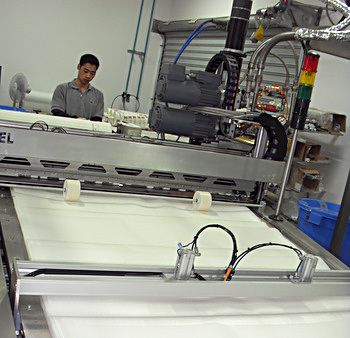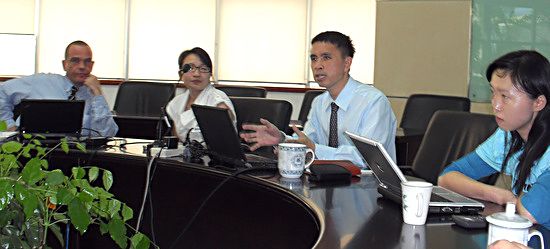
SINGAPORE-BASED SINOMEM Technology Ltd (SGX: SINO), maker of polymer membranes for water treatment, separation and purification technologies, as well as trading in fine chemicals and nutraceutical products, had a watershed quarter.
Much of this has to do with the growth in wastewater treatment facility orders, and Sinomem has an aggressive target of reaching 40 such large-scale contracts by 2012 from just a dozen currently.
Sinomem’s revenue in the first three months surged 55% year-on-year to 32.4 mln sgd, helping the Singapore-listed firm report a 39% rise in net profit to 6.9 mln sgd. This after the top line rose 18% last year to 126.8 mln sgd.
Every time someone takes a sip of Diet Coke or 80 proof Absolut Vodka, Sinomem’s technology may well have helped the bottler or distiller maker sure that the sugar and excess alcohol were removed from the final product.
But it is the large-scale water treatment projects that are captivating the company’s attention, and contributing most to its revenue.
Water Projects: Flood of Opportunities
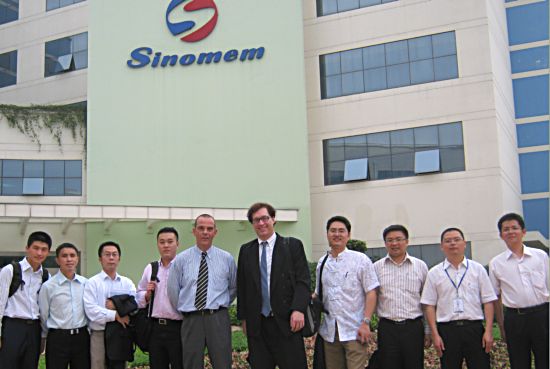
More important than beverage separation-related orders was the growing demand from both the Chinese government – as well as increasingly environmentally conscious citizens – for both cleaner drinking water and better treatment of wastewater reentering the water table or being released into ponds, lakes, streams, creeks, rivers, and ultimately the seas.
Sinomem’s broad and expanding line of membrane products and technology is exactly what both private firms, state-owned industries and municipal wastewater treatment plants are coveting to help bring their operations up to ever tighter environmental and consumer quality standards.
“We are striving to be a global leader in the development of advanced membrane technology for water purification, wastewater treatment and cleaner production,” said Mr. Lan Chunguang, Vice President of Sinomem Technology Ltd and General Manager of the membrane technology division of the group.
He recently told a group of six Greater China fund managers attending a trip organized by Aries Consulting and Financial PR to six listed firms in Fujian province that both natural market trends as well as more onerous restrictions on wastewater treatment and drinking water supply were creating a flood of opportunities for Sinomem.
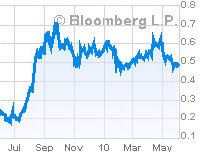
“Requirements for wastewater and drinking water are getting more and more strict in China. Therefore, water pollution control will remain our main emphasis going forward, and membranes for water treatment are the most promising business growth area for us right now, and we currently give it top priority,” Mr. Lan said.
He said this had everything to do with the company's recent performance.
In line with the recovery of the global economy, our revenue performed much better on a year-on-year basis. This was mainly due to increased contribution from both the water treatment segment and downstream segment. The membrane processing/engineering and water treatment segments recorded a 41% jump in revenue to 22.8 mln sgd. Our gross profit increased by 59% to 10.3 mln sgd in the first quarter compared to a year earlier.”
Bids for municipal wastewater treatment plants in China were decided via public tender, but Sinomem did not perceive any favoritism given to domestic firms come contract awarding time, even for very large-scale lucrative projects.
“We are a Singapore-based, foreign company in China, but our production is all conducted in China so we do win a very impressive number of public contracts, even while vying head-to-head with domestic state-owned enterprises.
“So we feel we are welcomed here, and aren’t at all handicapped in terms of being granted contracts as a non-domestic firm. The market is just so huge here and growing so rapidly that opportunities for any competitive firm exist,” he said.
40 by 2012
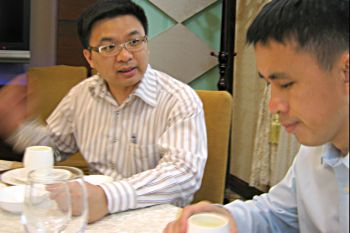
Suntar International Group, the holding company parent of Sinomem Tech, was founded in 1996 by Mr. Lan’s brother, Dr. Lan Weiguang, who is founder and Chairman of the Board and earned a PhD in science from the National University of Singapore in 1995.
The CEO, who grew up in a poor village in Fujian province, said a few years back: “I didn’t go into science thinking it would be a lucrative field. Higher education was initially a means of survival. It was a guarantor that I could find work and not go hungry.”
He is Singapore citizen and an adjunct professor at his alma mater.
Ambition runs deep in the Lan family.
Mr. Lan Chunguang followed in his older brother’s academic footsteps, and is currently pursuing an Executive Master of Business Administration, also at the National University of Singapore.
This energetic and ambitious family trait is exemplified in the firm’s bold reach into more industrial sectors and its explosive growth in self-developed technologies.
The company has developed more than 400 membrane separation technologies and processes, and has proprietary ownership of numerous related intellectual property rights (IPR) and patents.
|
|||||||||||||
But an even better sign of management’s optimism for the industry going forward is its ambitious forecast to have 40 wastewater treatment facility membrane supply and installation contracts by 2012.
As part of this goal, Sinomem is also setting its sights very high, targeting a total daily treatment capacity of 1.5 mln tons for the 40 projects.
This is a very energetic goal, as the company currently has 12 facilities of this size across China – all city wastewater treatment facilities spread across five provinces: Jilin, Henan, Jiangxi, Hubei and Jiangsu.
“China’s goal is to have a 30% reused rate for its water supply by the end of this year, and our technology is key to helping the country meet that target. This is a big jump, as the percentage was in the single digits just a few years ago.
“We need to take full advantage of the fast-growing wastewater treatment and reusable water markets,” Vice President Lan said.
The build-operate-transfer (BOT) model was Sinomem’s desired way of doing business for major municipal engineering projects like wastewater treatment facilities due to reasons of financial stability and recurring income.
Additionally, contract signings were not a one-off income by any means, as most membranes needed regular replacement.
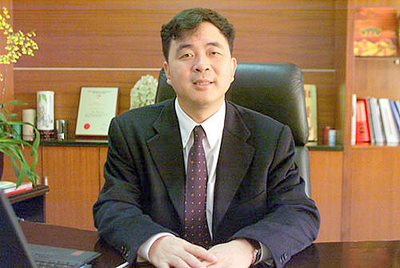
“Around 20% of membrane efficiency is lost within 2-3 years. So users of these products need to either replace or install higher treatment capacity at the outset. In addition, membranes generally have a 5-7 year lifespan,” he said.
That meant that wastewater treatment plants and other consumers of Sinomem’s products often bought more membranes than necessary at the time of initial installation in order to be compliant with minimum standards after 2-3 years when membranes began to taper off in their ability to trap particles.
“To keep up with requirements, our buyers often need to begin at 120% capacity to factor in 20% efficiency falloff in 2-3 years. This means that after that period, they are at 100% capacity and still meeting minimum standards.”
When asked if he was kept awake at night worrying that Chinese competitors would mimic Sinomem’s hard-earned technology, remanufacture identical membranes, and undercut them on price during public tenders, Vice President Lan said he was increasingly confident in the integrity of patent protection in China.
“It is in China’s own interest to protect IPR in all areas. Domestic firms currently have 50 membrane technology patents in application, so they are not going to jeopardize these. There is clearly a stronger and stronger R&D and IPR protection environment in China.”
At the end of the day, he was very sanguine on prospects for Sinomem this year and beyond.
“With signs of gradual recovery in the global economy, we expect to see increased contribution from all segments. In particular, our water treatment segment will continue to be the growth driver as we target to complete construction work of another 4 BOT water treatment plants. We will continue to explore opportunities for realizing the value of the downstream segment via a restructuring or disposal.”
Recent story: SINOMEM 'remains under-valued and mispriced'



